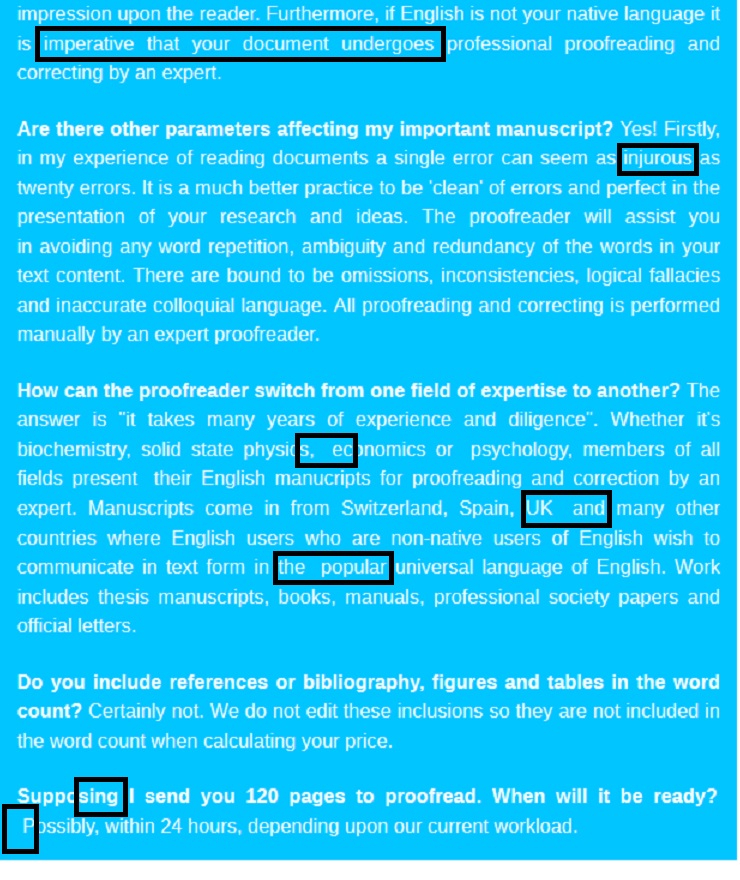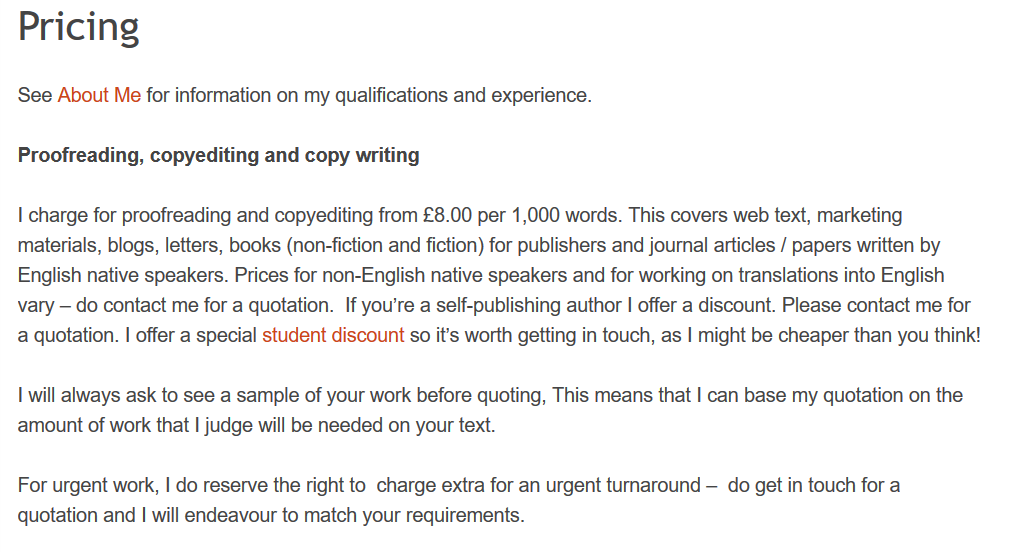Happy Tuesday evening! It’s time for another edition of Typo Tuesday. For this week’s entry, I’d like to present some screenshots from companies that offer proofreading and editing services. Yes, that’s correct.
I have well over a decade of experience copyediting and proofreading for two companies as well as even more experience helping out friends and family, but I haven’t done much freelance work for individuals I don’t know already. The freelance work I have done was paid hourly, but it seems that a lot of clients prefer to pay by the word or by the page. I wanted to do some research on what other freelance proofreaders charge when they charge by the unit rather than by the hour.
What I found was… interesting. I’ve said it before and I’ll say it again that even proofreaders need proofreaders, and I’m sure there will eventually be errors on Lee the Linguist (if there aren’t already). However, I was rather shocked by how often I found errors on websites selling proofreading services, and even more surprisingly, on the pages where they stress the importance of having your work proofread!
I’m old enough that I guess nothing in this world should shock me anymore, but to be honest, it did. I almost wonder if some of these errors are a joke, but then I think again about the fact that they’re selling proofreading services. I’m stumped.
Here are a few examples, but believe me, not all of them!

The above is from a European site offering editing services, and this is their page where they really try to sell their skills. I put boxes around parts that I find questionable.
First of all, the box that contains “imperative that your document undergoes” sounds so wrong to me as an American, especially after studying Spanish forever! To me, the verb “undergoes” should definitely be “undergo” because the phrase is an example of the present subjunctive. If you don’t know grammatical terms, you’re probably saying, “Huh?” Here is a site that explains it in detail. Now, I have read that in British English the present subjunctive is not always used in this type of situation (“it’s imperative that you ___”), but to me it sounds very ignorant not to use it.
I guess this is a case where you have to know whether you want a document to be edited to British English, American English, Canadian English, etc. While I enjoy reading British books and news sites, as an American who hasn’t lived in the UK, I only feel comfortable editing to standards of American English.
The next box is a simple typo that would have been caught by any spell checker. The word is “injurious.” I thought that perhaps I was missing a British variant, but after some searching, I don’t think so. It’s just a sloppy mistake.
The other boxes, other than the one that contains “Supposing,” are spots where I strongly suspect there’s an extra space that shouldn’t be there. Clearly, they justified the text so it aligns on the left and right, so from line to line there will be varying amounts of space in between the words, but within the same line the spacing should be roughly the same. In these spots there’s a big enough difference that if there’s not a mistaken extra space there, it still looks sloppy as if there is one. They should have chosen a different format, in my opinion. In fact, there are other spots I didn’t put boxes around that I suspect may have an extra space as well, but these examples suffice.
As for “Supposing,” when they use the -ing form of the verb rather than the imperative “Suppose,” this sentence is a fragment. Alternatively, if they combined the two sentences it would be fine: “Supposing I send you 120 pages to proofread, when will it be ready?” If this is an example of their best work, I’d stay far, far away.

The above screenshot is from a British proofreader’s page where she describes her work and fees. I didn’t put boxes on this screenshot, but there are a few issues here.
Firstly, from everything I can find, there should not be spaces in between the words where it says “articles/papers.” I checked various sources, including British ones, and the only cases where you should put a space before and after a slash are when you’re indicating a line break in a poem or possibly when you have two compound items that are being separated by the slash. An example would be “North America / South America.”
Another issue that strikes me as strange is where she says “non-English native speakers.” I guess that’s a style preference, but I’m sure it’s much more common to say “non-native English speakers.” I’m a non-native Spanish speaker and a non-native Japanese speaker. It just sounds better.
There’s a punctuation issue in the next paragraph. As she has it, there’s only one sentence there, but after the comma she capitalizes “This.” If she just changed the comma to a period, that would be fine, or it would also work if she changed the capital “T” to a small one and changed the comma to a semicolon or a dash — an “em dash,” specifically.
Note that while the page I just linked to recommends omitting spaces before and after an em dash, they do acknowledge that there are styles that include the spaces. I prefer to include spaces before and after the dash in my own writing but I’m certainly aware of the controversy!
Finally, the last paragraph also has a couple of spots where I suspect there’s a superfluous space: “to charge” and “turnaround — do get.” It looks like there’s an extra space after the dash and before “do” in the second case.
The last example for tonight (screenshot below) is from a page that I strongly suspect was written by a high-level non-native speaker. To be honest, this piece of writing is very well done for a non-native speaker, but I’d rewrite many of the sentences or at least tweak them. Many areas have words out of place and punctuation that looks strange to me. The structure of a lot of the sentences just seems unnatural. If I had to guess, I’d guess that this was written by an educated non-native English speaker from… India? What do you think?

I’m not even trying to put the writer down — I know how hard it is to write in a second/third/fourth language! It does seem a bit strange on a page advertising editing services, though. This is why good editors and translators generally work in or into their native language. I have edited Spanish writing before, and even short bits of French, but I have no confidence in editing French at all; I was told to do it by my boss and there was no one else who could do it. I did it because I had to but I’d never claim that as a skill I have!
I do often see errors in Spanish but I wouldn’t seek out a job where my sole responsibility is editing Spanish. In other words, I can proofread Spanish pretty well for typos, punctuation, and grammar, but I wouldn’t feel nearly as confident editing the structure of complex high-level Spanish writing. I could give it a shot and do very well, I’m sure, but my confidence level would be substantially lower than my confidence in my English. There’s a Spanish flier I saw that may end up as the subject of a future post, but again, that’s simple proofreading of simple writing, not complex paragraph editing!
Well, that’s it for tonight! Let me know if I have errors in this post because after critiquing the work of other editors there are sure to be some!